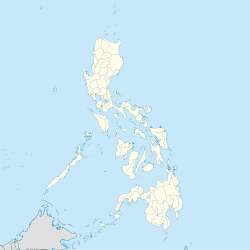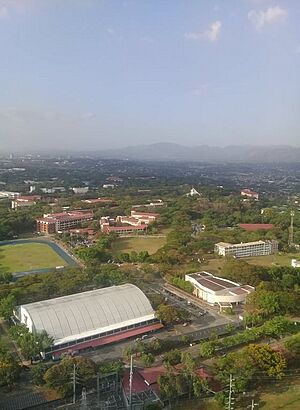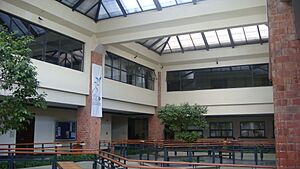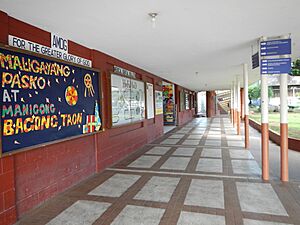Ateneo de Manila University facts for kids
|
Pamantasang Ateneo de Manila (Filipino)
|
|||
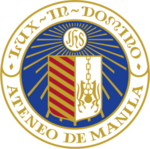
University seal
|
|||
| Latin: Ūniversitās Athēnaea Manīlēnsis | |||
|
Former names
|
|
||
|---|---|---|---|
| Motto |
Lux in Domino
|
||
|
Motto in English
|
Light in the Lord | ||
| Type | Private, research, non-profit, coeducational basic and higher education institution | ||
| Established | December 10, 1859 (165 years and 115 days) | ||
|
Religious affiliation
|
Roman Catholic (Jesuits) | ||
|
Academic affiliations
|
|
||
| Chairman | Bernadine T. Siy | ||
| President | Fr. Roberto C. Yap, SJ | ||
|
Academic staff
|
approx. 2,470 | ||
|
Administrative staff
|
3,015 | ||
| Students | 15,269 (university level) | ||
| Undergraduates | 8,614 | ||
| Postgraduates | 6,655 | ||
|
Other students
|
approx. 6,500 (grade school and high school) | ||
| Location |
Loyola Heights, Quezon City, Metro Manila, Philippines
Salcedo Village, Makati, Metro Manila, Philippines Rockwell Center, Makati, Metro Manila, Philippines
Ortigas Center, Pasig, Metro Manila, Philippines
14°38′20″N 121°4′40″E / 14.63889°N 121.07778°E |
||
| Campus | Urban (main campus) 83 hectares (210 acres) |
||
| Newspaper | The Guidon | ||
| Colors | Blue and White |
||
| Nickname | Blue Eagles | ||
|
Sporting affiliations
|
|
||
| Mascot | Blue Eagle | ||
Ateneo de Manila University (Filipino: Pamantasang Ateneo de Manila; Spanish: Universidad Ateneo de Manila), also known simply as Ateneo de Manila or Ateneo, is a private, Catholic, teaching and research university, as well as a basic education institution in Quezon City, Philippines. Founded in 1859 by the Jesuits, it is the second-oldest Jesuit-administered institution of higher learning in the Asia-Pacific.
Considered one of the top universities in the Philippines, the university provides primary and secondary education as well as undergraduate and graduate instruction in the humanities, social sciences, natural sciences and engineering, and business. It offers professional degrees through the Graduate School of Business, the School of Government, the School of Medicine and Public Health, and the Ateneo Law School. Known for its Jesuit liberal arts tradition, the humanities are a key feature of Ateneo education at all levels of study.
Contents
History
Following the return of the Jesuits to the Philippines in the 19th century, they acquired a small private school in Manila called Escuela Municipal and renamed it to the Ateneo Municipal de Manila in 1859. The school was initially located in the Intramuros district until 1932 when it was destroyed by fire. This forced the transfer of the campus to neighboring Ermita. However, the campus was again destroyed during the Battle of Manila in 1945. Following the Second World War, the campus was gradually transferred to its current location in Loyola Heights, Quezon City, while the Ermita site was eventually sold to Robinsons Malls and is now the site of the Robinsons Manila Mall.
On September 25, 1969, Fr. Pacifico Ortiz, SJ was installed as the first Filipino president of Ateneo de Manila University. At this time, the Graduate School split into the Graduate School of Arts and Sciences and what would become the Graduate School of Business. In 1968, Ateneo co-founded the Asian Institute of Management. Ateneo college opened its doors to its first female students in 1973. The Graduate School of Arts and Sciences moved to Loyola Heights in 1976, and the Padre Faura campus closed in 1977 as the Graduate School of Business and the Law School moved to Salcedo Village, Makati. In February 1978, Ateneo opened what would become the Ateneo Computer Technology Center.
As student activism rose in the 1970s following the proclamation of martial law by President Ferdinand Marcos, Ateneans took an active role along with student organizations from other colleges and universities. On February 11, 1986, alumnus and Antique Governor Evelio Javier was shot and killed. Two weeks later, Ateneans joined thousands of Filipinos in the People Power Revolution along EDSA to oust Marcos.
In 1991, the School of Law became the first law school in the Philippines to confer the Juris Doctor degree. The Ateneo School of Government was established in 1996 and, in 1998, a campus housing the Ateneo Graduate School of Business, Ateneo School of Law, and the Ateneo School of Government, opened in Rockwell Center in Poblacion, Makati. The Science Education Complex was also completed in the Loyola Heights campus. In 2000, the School of Arts and Sciences, consisting of the undergraduate and graduate schools, was restructured into the Loyola Schools. In April 2002, the office of the university president established Pathways to Higher Education-Philippines, one of the university's outreach initiatives, with the help of the Ford and Synergeia Foundations. In July 2002, the Church of the Gesù was completed in the Loyola Heights campus. In 2003, Ateneo entered into its partnership with Gawad Kalinga, its first formal, university-wide social action program.
In July 2006, the Manuel V. Pangilinan Center for Student Leadership was completed. The Ateneo School of Medicine and Public Health facility in Ortigas Center, Pasig welcomed its first batch of professional students in June 2007. In 2008, work on a new Rizal Library facility began and a new set of university dormitories was inaugurated.
On July 24, 2022, a former mayor of Lamitan, Basilan, and two others were killed. As a result, the scheduled graduation ceremonies of the university's law school were cancelled.
In October 2022, Ateneo began the process of consolidating the Loyola Schools and Ateneo Professional Schools into its Higher Education cluster.
Campuses
Currently, the main Ateneo de Manila campus is located along Katipunan Avenue in Loyola Heights, Quezon City, Metro Manila. The campus houses the college and the university's grade school and high schools, as well as the Loyola School of Theology. Two other campuses, in Rockwell Center and Salcedo Village, both in Makati, house the university's graduate schools of business, and law. A fourth facility in the Don Eugenio López Sr. Medical Complex in Ortigas Center, Pasig, houses its school of medicine and public health.
Loyola Heights
The 83-hectare (210-acre) main campus is located in Loyola Heights, along the eastern side of Katipunan Avenue, and is south of and adjacent to the campus of Miriam College. The Grade School, High School, and College are located in Ateneo's Loyola Heights campus. Beside the Grade School is the Henry Lee Irwin Theater, built in 1995 to house the school's formal events and productions. Complementing the old college buildings are the Science Education Complex, as well as the PLDT Convergent Technologies Center and the John Gokongwei School of Management Complex. In 2018, the university inaugurated the Areté, Ateneo's "creative hub" for visual, practical, and performing arts. The Areté houses the Ateneo Art Gallery, the Hyundai Hall (a 900-seat theater), the Doreen Gamboa Fernandez Black Box Theater, the Unionbank Ubuntu Space, and spaces for Ateneo's collaborative degree program with Le Cordon Bleu. The Department of Fine Arts and the Ateneo Institute for the Science and Art of Learning and Teaching also hold office in the Areté.
Within the campus is the Rizal Library, the main university library. Also located here are numerous units and research centers affiliated with Ateneo, such as the Institute of Social Order, Institute of Philippine Culture, Institute on Church and Social Issues, Asian Public Intellectuals Fellowships, the Jesuit Communications Foundation, the Jesuit Basic Education Commission, and others. Also situated here are the East Asian Pastoral Institute, Loyola School of Theology, and the San Jose Seminary, all Jesuit formation institutions federated with Ateneo de Manila University. The Loyola Heights campus also hosts three scientific research institutions: the Philippine Institute of Pure and Applied Chemistry, the National Chemistry Instrumentation Center, and the Manila Observatory.
Its athletic facilities include the Blue Eagle Gym, also known as the Loyola Center, standing at the southern end of the campus, and the Moro Lorenzo Sports Center (MLSC) on the northern end. The Blue Eagle Gym is one of the largest gymnasiums among the universities in Metro Manila while the MLSC is often used by the Philippines men's national basketball team as well as other professional teams for their training needs.
The Church of the Gesù, completed in July 2002, stands on top of the Sacred Heart Hill and overlooks the rest of the campus. The school's chapels include the St. Stanislaus Kostka Chapel and the Chapel of the First Companions in the high school, the Chapel of the Immaculate Conception in the college complex's Gonzaga Hall, the chapel at the Loyola House of Studies, and the Chapel of the Holy Guardian Angels in the grade school, among others. Two parish churches outside the campus, the Our Lady of Pentecost Parish in Varsity Hills and the Santa María della Strada Parish in Diliman, are within walking distance from the campus.
Ateneo de Manila is also home to the largest Jesuit community in the Philippines, most of whom reside at the Jesuit Residence in the Loyola Heights campus. These Jesuits are involved in teaching, administration, and research within the university and its affiliated units.
Ateneo de Manila University established the Ateneo Institute of Sustainability in 2013 to oversee the research and implementation of the university's sustainable development initiatives. In 2014, Ateneo launched an electric jeepney shuttle system operated by Meralco within its Loyola Heights campus to replace motorized tricycles as the means of transporting students and personnel around the campus; Ateneo was the first educational institution in the Philippines to implement an electric jeepney transportation system.
Satellite campuses
The Rockwell Center campus of Ateneo de Manila University in Makati houses the School of Law, Graduate School of Business, AGSB-BAP Institute of Banking, and the Ateneo Center for Continuing Education. It includes several research centers, a moot court facility, and the Ateneo Professional Schools Library.
The Salcedo Village campus in Makati houses the different facilities of the former Ateneo Information Technology Institute and the Ateneo Center for Continuing Education. This facility formerly housed the Professional Schools prior to the completion of the Rockwell campus in 1998.
The Ateneo School of Medicine and Public Health (ASMPH) at the Don Eugenio López Sr. Medical Complex in Ortigas Center, Pasig, opened its doors to its pioneering batch of students in June 2007. Beside the ASMPH is its partner hospital, The Medical City.
Ateneo Blue Cloud
Amidst the COVID-19 pandemic in 2020, Ateneo de Manila University launched the Ateneo Blue Cloud (stylized AteneoBlueCloud), an online platform for the university's scholarly community. Branded as the university's "virtual campus", the Ateneo Blue Cloud hosts school curricula materials based around their framework of an "adaptive design for learning", wherein online, blended, and face-to-face educational programs are accessible by registered users.
Administration and organization
Ateneo de Manila University is governed by a board of trustees currently chaired by Bernadine T. Siy. A central administration, led by President of Ateneo de Manila University Roberto Yap, oversees key initiatives related to academics, international programs, university development and alumni relations, personnel, security, and other university-wide concerns. Yap succeeded Jose Ramon Villarin, on August 1, 2020.
There are also designated vice presidents for Social Development (overseeing social initiatives); University and Global Relations (overseeing internationalization and institutional linkages); Finance (who also acts as the University Treasurer); and Administration & Human Resources.
Ateneo de Manila has been granted autonomous status by the Philippine Commission on Higher Education (CHED) since 2001, granting it relative leeway in introducing new programs. It is one of few universities in the country to be granted this status, which recognizes a number of the university's programs and departments as Centers of Excellence and Centers of Development.
The university is organized into twelve schools, grouped into two units: the higher education unit, and the basic education unit. Each unit is led by a vice president. Each basic education school is led by a principal (JHS and SHS) and a headmaster (grade school); meanwhile, the individual schools under the higher education unit are led by deans, who in turn oversee department chairs and program directors.
Higher education
Ateneo de Manila University's higher education unit consists of nine schools. These are the School of Humanities (SOH); the John Gokongwei School of Management (JGSOM); the School of Science and Engineering (SOSE); the School of Social Sciences (SOSS); the Gokongwei Brothers School of Education and Learning Design(GBSEALD); the Graduate School of Business, which confers the Master of Business Administration (MBA) and Master in Entrepreneurship degrees; the Ateneo School of Law, which confers the Juris Doctor (JD) and Master of Laws (LL.M.) degrees, the Ateneo School of Medicine and Public Health (ASMPh), which offers an integrated Doctor of Medicine (M.D.) - MBA program, and the Ateneo School of Government, which confers the Master in Public Management and Ph.D. in Leadership Studies degrees.
Ateneo de Manila University higher education unit was created by consolidating two existing units: the Loyola Schools, which comprised most of the schools in the Loyola Heights campus offering undergraduate programs; and the Professional Schools, which offered graduate programs and, with the exception of the Ateneo School of Government, were based in the university's satellite campuses in Rockwell the and Ortigas Center.
Basic education
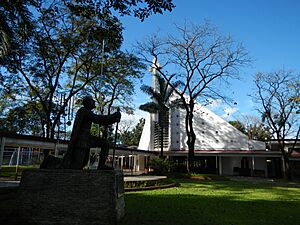
The Ateneo de Manila Grade School (AGS) is the elementary education unit of Ateneo de Manila University, and is the oldest unit in existence - Ateneo de Manila began as a government-run primary school during the Spanish colonial period. It was previously an all-boys school, before switching to co-education in the 2024-25 academic year.It has a population of around 4,000 students. The school had implemented the K-12 program since the 2013–14 academic year. The Ateneo de Manila Grade School is one of the first elementary schools in the Philippines to adopt the Singapore math curriculum.
The Ateneo de Manila Junior High School (AJHS) is the middle school unit of Ateneo de Manila University, offering the seventh to tenth grades for male students. It was established in 2013 to comply with the Philippines' K-12 education system. It currently occupies the old Ateneo de Manila High School campus.
The Ateneo de Manila Senior High School (ASHS) is the senior high school unit of Ateneo de Manila University, offering the eleventh and twelfth grades since 2013 following the restructuring of the university's high school units in adherence with the national K-12 program. Since the 2016–17 academic year, the ASHS has accepted female students.
The ASHS offers all four academic strands of the K-12 program (Accountancy and Business Management; Humanities and Social Sciences; Science and Technology, Engineering, and Mathematics; and the General Academic). The ASHS currently occupies the new senior high school building topped off in 2016.
Loyola School of Theology
The Loyola School of Theology is a Jesuit school of theology and pastoral studies, run separately from but federated with Ateneo de Manila University. It is located in the portion of the university's Loyola Heights campus that is geographically within Marikina. The school offers baccalaureate, licentiate, and doctoral ecclesiastical degrees in theology, as well as postgraduate degrees in theological studies, theology, and pastoral ministry from Ateneo de Manila. It also supports the theology and religious education postgraduate programs of the Ateneo de Manila University School of Humanities's Department of Theology.
Academics
Ateneo offers instruction in the primary, secondary, undergraduate, and graduate level. It is a research university that offers 48 undergraduate degrees, 93 graduate degrees, and 11 professional degrees. Dual/joint degree programs are offered within the schools and with other universities as well. Individual schools conduct separate admissions processes; admission into one unit in no way guarantees admission into another unit.
As is common in the Philippines, the primary medium of instruction is English, with a few classes taught in Filipino. Aside from teaching and research, Ateneo de Manila also engages in social outreach.
A key feature of Ateneo's higher education is a liberal arts undergraduate core curriculum, required for all undergraduates. It includes philosophy, English and Filipino literature, theology, history, various branches of social sciences, and a community service component. Undergraduate programs at Ateneo are aimed at fostering student-centred learning. Ateneo follows the semester hour system common in American universities. Most classes are held below 40 students and student discussion is encouraged.
Reputation and rankings
| University rankings | |
|---|---|
| Global – Overall | |
| QS World | 516 (2025) |
| QS Employability | 151–160 (2023) |
| THE World | 1001–1200 (2024) |
| Regional – Overall | |
| QS Asia | 137 (2024) |
| THE Asia | 401–500 (2024) |
| National – Overall | |
| QS National | 2 (2024) |
| THE National | 1 (2023) |
Ateneo is considered to be one of the most prestigious universities in the Philippines. Ateneo made its debut in the 2023 edition of the Times Higher Education World University Rankings as the top university in the Philippines, placing it in the 351–400 bracket of its 2023 Global rankings list, and 84th in its Asian rankings list. As of 2025, the university is ranked in the 1001–1200 bracket and 401–500 bracket, respectively. The QS World University Rankings ranked Ateneo first among private universities and second among all universities in the Philippines in both its World University Rankings and Asia Rankings. As of 2025, the university is ranked 516th and 137th, respectively. Ateneo has appeared on the QS rankings since 2005.
As of 2025, Ateneo de Manila University is ranked fourth in the Philippines by the Webometrics Ranking of World Universities. Ateneo ranks fifth in the list of top 12 universities in the Philippines by the SCImago Institutions Rankings (SIR), and third by EduRank in its list of 100 best universities in the Philippines. Ateneo has yet to appear in any edition of the Academic Ranking of World Universities (ARWU).
The Commission on Higher Education has designated Ateneo with 11 Centers of Excellence and 6 Centers of Development. The 11 Centers of Excellence are in Information Technology, Chemistry, Mathematics, Physics, English Literature, Philosophy, Biology, Psychology, Sociology, Business Administration or Management, and Entrepreneurship. The 6 Centers of Development are in Environmental Science, Communication, Electronic Engineering, History, Philippine Literature, and Political Science.
In 2005, the academic programs of Ateneo were granted a Level IV accreditation—the highest possible level—from the CHED through the Federation of Accrediting Agencies of the Philippines (FAAP) and the Philippine Accrediting Association of Schools, Colleges and Universities (PAASCU). In 2011, it was also granted an Institutional Accreditation by the same body, the first time that both citations were awarded to a university simultaneously.
The Ateneo grade school and high school divisions have both garnered the highest level of accreditation from the Philippine Accrediting Association of Schools, Colleges and Universities and the Federation of Accrediting Agencies of the Philippines, making it one of the top schools in the country for primary and secondary education, as of 2017.
Graduate school rankings
The Legal Education Board has ranked the Ateneo de Manila School of Law as the top law school in the past decade, producing a 7.18% share or 1,794 out of total new lawyers. The school continues to consistently have the highest passing rate for first-time examinees, topping the 2020/2021 and 2022 Bar Examinations. Graduates of the Ateneo Law School have an average grade of 89.2 in the Philippine Bar Examination and the school has produced 23 top notchers in history, the second highest number of bar top notchers.
The Professional Regulation Commission has ranked the Ateneo School of Medicine and Public Health as the best performing medical school in the Philippines in 2019, as the school had a 100% passing rate in the Philippine Physician Licensure Examination out of 133 examinees.
The Ateneo School of Government has been ranked as one of the top public policy schools and is the only Philippine institution listed in the first-ever ranking of public-policy schools in the Asia-Pacific region. The school was ranked 25th by citation impact factor, with a total of 7 citations scoring 1.17 impact factor.
Eduniversal ranked the Ateneo Graduate School of Business as one of the top business schools in the country, ranking 3rd with 3 Palmes of Excellence in 2021.
Research centers and auxiliary units
Some of Ateneo de Manila's most active research hubs work in the fields of disaster risk reduction, prevention, and management; public education; human migration; and governance. The university houses several research centers, and has many links with industry partners, government agencies, and research networks. Some research centers, called auxiliary units, are established by the university board of trustees, while others are organized by individual schools or departments.
- Ateneo Center for Asian Studies
- Ateneo Center for Economic Research and Development
- Ateneo Center for Educational Development
- Ateneo Center for English Language Teaching
- Ateneo Center for Organisation Research and Development
- Ateneo Center for Psychological and Educational Assessment
- Ateneo Center for Social Entrepreneurship
- Ateneo Center for Social Policy and Public Affairs
- Ateneo Family Business Development Center
- Ateneo Innovation Center
- Ateneo Institute of Literary Arts and Practices
- Ateneo Java Wireless Competency Center
- Ateneo Language Learning Center
- Ateneo Macroeconomic Research Unit
- Ateneo-PLDT Advanced Network Testbed
- Ateneo Research Network for Development
- Ateneo Teacher Center
- Ateneo de Manila University Press
- Ateneo Wellness Center
- Center for Communication Research and Technology
- Center for Community Services
- Eugenio Lopez Jr. Center for Multimedia Communication
- Gaston Z. Ortigas Peace Institute
- Governor José B. Fernandez Ethics Center for Business and Public Service
- Institute of Philippine Culture
- Institute of Social Order
- Institute for Church and Social Issues
- John Gokongwei School of Management Business Accelerator
- John Gokongwei School of Management Business Resource Center
- Konrad Adenauer Asian Center for Journalism
- Manila Observatory
- National Chemistry Instrumentation Center
- Ninoy and Cory Aquino Center for Leadership
- Pathways to Higher Education-Philippines
- Philippines-Australia Studies Network
- Philippine Institute of Pure and Applied Chemistry
- Ricardo Leong Center for Chinese Studies
Social initiatives
Ateneo is involved in numerous civic activities. Social engagement is considered by the university as a key part of education and is integrated into the curricula of all university programs. Social entrepreneurship is also integrated into many of its academic programs.
Ateneo's social projects include the Ateneo-Mangyan Project for Understanding and Development to help the Mangyan indigenous group from Mindoro, the Bigay Puso and the Christian Service and Involvement Program for grade school students, and the Damay Immersion and Tulong Dunong program for senior high school students. In college, social development is fostered by programs of the Office of Social Concern and Involvement, including house-builds with the poverty alleviation movement Gawad Kalinga and the Ateneo Labor Trials Program tied into junior philosophy classes. Student organizations and offices of Ateneo also operate their own social involvement programs. At the Ateneo Professional Schools, programs and units like the Graduate School of Business' Mulat-Diwa, the Leaders for Health Program, and the Law School's Human Rights Center and Legal Aid programs aim to form leaders. Other Ateneo initiatives include Pathways to Higher Education to help the underprivileged youth and the Ateneo Center for Educational Development which conducts national teacher and principal training programs.
The centerpiece social program of the university is its university-wide social action program in partnership with Gawad Kalinga which has helped build communities and schools in Payatas, Quezon City, in many Nueva Ecija municipalities, and three villages in the Bicol Region. The Ateneo–Gawad Kalinga partnership has also driven Kalinga Luzon, a rehabilitation effort for the victims of Typhoon Nanmadol (Yoyong); GK Youth–Ateneo, one of the largest and most active student social programs of Ateneo; Kalinga Leyte, an ongoing program which aims to provide long-term rehabilitation for the victims of the Southern Leyte landslide and Typhoon Haiyan (Yolanda), and ongoing reconstruction efforts for typhoon-stricken Bicol.
The Ugat Foundation, an apostolate for grassroots families, is also located at Ateneo.
International collaboration
Ateneo has international links with several universities, institutions, and organizations, particularly in Asia, Australasia, North and South America, and Europe. Through these cooperative efforts, the university hosts visiting faculty and research fellows from institutions abroad, and in turn, Ateneo faculty members also engage in teaching, research, and study in institutions abroad. International cooperation also includes active student exchange through Philippine immersion programs.
Since 2008, the Global Leadership Program was started for students from three other Catholic Jesuit universities in East Asia aside from tAteneo: Fu Jen Catholic University in Taiwan, Sogang University in South Korea, and Sophia University in Japan.
Ateneo has partnered with several international institutions in offering certain degree programs. In 2006, Ateneo partnered with the Sun Yat-sen University in Guangzhou to establish a Confucius Institute. The institute has since offered Mandarin Chinese courses, a Masters in Teaching Chinese as a Foreign Language program, and a scholarship grant for students to study in Chinese colleges and universities. In 2018, the Ateneo Department of Information Systems and Computer Science has partnered with the Queen Mary University of London to offer a double master's degree. In 2019, the School of Management ventured with French culinary school Le Cordon Bleu to establish the Le Cordon Bleu Ateneo de Manila Institute at the Areté. The institute offers a bachelor's degree through the John Gokongwei School of Management as well as professional degrees at the Center for Continuing Education at the Graduate School of Business. Other universities that Ateneo has partnered with to offer joint master's degree programs are the École supérieure des sciences commerciales d'Angers in France, Kyushu University in Japan, Regis University in Denver, and the University of Sydney in Australia.
Ateneo has also collaborated with the Nippon Foundation and the University for Peace (UPEACE) in Costa Rica to initiate the Asian Peacebuilders Scholarship program. Under the program, students train to become peacebuilding practitioners for a total of eight months at Ateneo and nine months at UPEACE, eventually receiving a master's degree in Transdisciplinary and Social Development from the Ateneo Department of Political Science and a Master of Arts degree from UPEACE.
Libraries and museum
Ateneo de Manila University has several libraries. The university's largest library is the Rizal Library, located in the Loyola Heights campus.
The Rizal Library is divided into the Old Rizal Library and the New Rizal Library. The New Rizal Library, a five-storey building which opened in November 2009, houses the library's circulation section and the Library's technical services facilities.
Ateneo Art Gallery
The Ateneo Art Gallery is housed in the Arts Wing of the Areté.
University Archives
The University Archives are housed in the Old Rizal Library annex building, also known as Faber Hall.
Student life
Housing
The Ateneo de Manila University Residence Halls consist of five separate residential halls: Cervini Hall, Eliazo Hall, the University Dormitory - North Tower, the University Dormitory - South Tower, and the International Residence Hall.
Student organizations
The Ateneo Debate Society, the undergraduate debate organization of the Ateneo de Manila University, is the highest-ranking debate team in the Philippines and all of Asia, ranking in the top 15 of the World University Debate Rankings since the mid-2000s, peaking at no. 7 in 2012. In 2023, they won their first World Universities Debating Championship title in Madrid, Spain, marking the first time that a Philippine university has won the world's largest international debating tournament, as well as the second Asian university to do so. The organization has also bagged the most number of championships in the United Asian Debating Championships, including previous Asian debating tournaments, with a total of 12 championships.
The Ateneo College Glee Club (ACGC) is the oldest extant university chorale in the Philippines. The ACGC has participated in numerous international choral and choir competitions including the European Grand Prix for Choral Singing.
The Ateneo de Manila High School's Dulaang Sibol, which began as the Ateneo High School Dramatics Society in 1955, is the oldest existing theater group in the Philippines.
Notable alumni
See also
 In Spanish: Universidad Ateneo de Manila para niños
In Spanish: Universidad Ateneo de Manila para niños
- De La Salle University – Ateneo de Manila University's major college rival
- Ateneo–La Salle rivalry
- Ignatius of Loyola
- List of colleges and universities in Metro Manila
- List of Jesuit educational institutions in the Philippines
- List of Jesuit sites
- Society of Jesus




